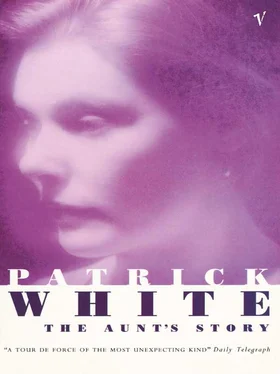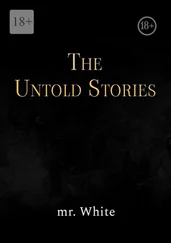‘Theodora, Mr Clarkson, sometimes has pretensions to be unusual,’ Mrs Goodman said.
‘It is understandable that Miss Goodman should feel as she does,’ said Mr Clarkson.
And he straightened a pearl that pinned his tie.
Theodora did not hear this, as she had gone out on to the balcony. In the room she had been disturbed, by its various undertones, and Mr Clarkson, he was the most disturbing of all, because kindness wears an expression that expects truth. Now she stood by herself on the cramped lower balcony, from which it was barely possible to see the bay. The landscape at which she looked was quite devoid of complexity. There was a smooth breeze in the big Moreton Bay fig. The afternoon was, in fact, as settled as the voices of middle age that murmured through the glass door, except that Theodora continued to see Jack Frost’s irreproachable façade, through which Frost himself had finally dared to pitch the stone.
Then Mr Clarkson came outside. Miss Goodman, he could see, was in a state of nerves. Her skin jumped.
‘I came out here to get the air,’ she said.
Her silence added that she hoped she would be left. But Mr Clarkson, who had the smooth texture and the smoky smell of rich, thick-set men of forty, did not hear silences.
‘I like your view, Miss Goodman,’ Mr Clarkson said. ‘It is my view reversed. If I stand on my balcony I can see yours. There, you see, the yellow house, beside the church.’
And he pointed at a square of stone, in a blur of trees, on the ridge that formed the opposite arm of the bay.
‘You must come one day and see for yourself.’
‘Thank you,’ she said. ‘I go out very little.’
‘All the more reason then.’
His voice compelled her to make the balcony her universe, outside which the sound of trees swam, words in the room, and the ripple of a dove. It would be very easy, she felt, to allow the kindness, the affluence, the smoky voice of Mr Clarkson to engulf. But because of this she resisted. She could feel her neck, under its lace frill, stiffen into bone. She hoped, with both her hands, to take refuge in her ugliness. Now she summoned it up from all the reflections that had ever faced her in the glass.
‘You will not find me very good company, Mr Clarkson,’ said Theodora Goodman’s mouth.
That she turned on him, her dark lips, that made a thin seam in the yellow skin. There were moments, said Huntly Clarkson, when Theodora Goodman was no longer scraggy, her head a strange dark flower on its long stem, but defensive, with a strange dark smell, like a lily that folds its lips secretively on a fly.
‘This question of company,’ he said, ‘is something for me to decide. The people who love us have a habit of sticking on labels that are never acceptable, and very seldom correct.’
‘Oh, and this is my daughter Theodora,’ Mrs Goodman had said. ‘Of course, you will know my younger girl, Fanny Parrott. At her mother-in-law’s. Fanny is a great favourite. With everyone.’
Mrs Goodman had let all this escape through her veil, in a last gasp of breath, the first morning, after the stairs. She wanted, she said, advice on many little things, none of them important, but still, it is always comforting to know that there is somebody to ask. Mrs Parrott had suggested, implied Mrs Goodman, that Mr Clarkson would offer that comfort and advice. Mr Clarkson agreed, amiably, above his desk, which was prosperous and broad, and at which he could already feel the tyranny of Mrs Goodman aimed. He noticed that she was a small, neat, hateful woman, with small, neat, buckled shoes, and many rings. She sat in the light and kept her ankles crossed. But her daughter sat in shadow, and drew with her parasol on the floor characters that he could not read. The daughter’s face was shadow under her large and timeless hat. Her clothes were quiescent and formalized as stone.
‘Then we shall see something of each other,’ Mrs Goodman commanded. ‘I shall expect you at our house.’
So it had come to that. On the balcony. In the afternoon.
‘He is my solicitor,’ said Mrs Goodman to Mrs Ewart and the gold-toothed Miss Stevenson. ‘He is Dolly Armstrong’s nephew. He is rich. He is a widower. Yes, I believe it was sad. Quite young. But there you are. He has everything else in life. His house is full of exquisite things.’
‘Tell us, Julia, now,’ asked Mrs Ewart, ‘is Theo interested at all? Poor Theo. It would be nice.’
‘I am too discreet to ask,’ Mrs Goodman said. ‘But Theodora is a fool. She is a stick with men.’
Miss Stevenson tweaked at the top of her glove. Her position had grown delicate.
‘I only thought,’ said Mrs Ewart, ‘it would be so nice.’
‘But what would Mr Clarkson want with Theodora?’ Mrs Goodman asked.
‘If you would come,’ said Mr Clarkson, ‘I would show you my fox terriers. I would ask you to lunch.’
Doves drowsed in the afternoon, in the sea glaze. This, felt Theodora, should be delightful if one knew how.
‘You are very kind, Mr Clarkson,’ she said. ‘Shall we go inside?’
And they did. They walked back into the conversation of the old women, behind which Theodora hid her indecisions. Then, saying something about a handkerchief, she went to her room, and stayed while voices combined in the hall, dawdled, and diminished.
The door banged twice, the permanently loose letter-box, before Mrs Goodman called, ‘Theo, where are you? Going off like that. Everyone wondered if you were ill. You are a strange girl.’
In her mind Mrs Goodman had already roughed out several landscapes, in which a younger, more exquisite version of herself stood in the foreground, holding Huntly Clarkson’s arm, whereas, in fact, she sat on her drawing-room sofa and thoughtfully moistened her lips. Reality struggled with her fantasy. She was consumed.
‘I went up to my room,’ Theodora said, ‘because I was bored.’
‘If that is the case, it was rude,’ said Mrs Goodman.
But because she did not believe, she burned.
‘An odd impression it will make on Mr Clarkson.’
‘Mr Clarkson asked me to lunch.’
‘You will go of course,’ said Mrs Goodman.
She could not wait for the answer, to feel her anger or contempt.
‘I don’t know yet,’ said Theodora, ‘whether I shall go or not.’
She would have liked to repay his kindness with a frank gesture of acceptance, the kind of gesture that Huntly Clarkson would expect, and get, from some woman of complexion, shadowless in a blue dress. The kind of woman who would receive a diamond brooch in a velvet box without a performance of gaucherie, who would press the hand that gave. Theodora remembered Huntly Clarkson’s hands, which were large and clean. The hands had rested on the stucco balustrade, waiting to give. But she could not, she thought, take, and regret rushed at her, so that she had to write:
Dear Mr Clarkson,
If you will forgive my failure to accept, I would like to come when you suggest.
Theodora Goodman
In this way Theodora Goodman went to the house of Huntly Clarkson, which stood in a blaze of laurels, a rich house, full of the glare of mahogany and lustre. The floors shone. There was an air of ease that disguised the industry which achieved this state. The servants were silent and well oiled. If they did not speak, it was because they had learnt their functions too well. They had a kind of silent contempt for anyone who did not understand what these functions were. So the servants of Huntly Clarkson looked at the shoulders of this woman helping herself to a cutlet, and condemned her as she tried to thank. Her glance was indication of her income and her status. She was a woman of no account, whose clothes were not of this or any fashion, whose face was ageless in appearance, though they would have put her somewhere in the thirties.
Читать дальше












